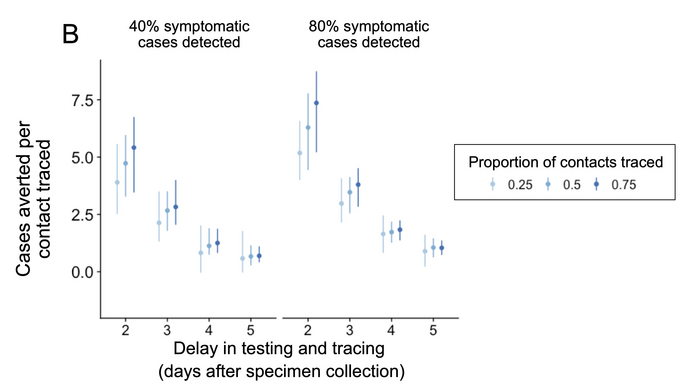AUSTIN, Texas – Contact tracing programs were deployed around the globe to slow the spread of COVID-19, but these programs could not prevent the multiple waves of transmission and loss of life that have occurred since March 2020. In a new study published in the Proceedings of the National Academy of Sciences, researchers at The University of Texas at Austin found that a five-day delay between identifying a case and isolating contacts was the Achilles’ heel of a contact tracing program in a large U.S. city.

Credit: The University of Texas at Austin
AUSTIN, Texas – Contact tracing programs were deployed around the globe to slow the spread of COVID-19, but these programs could not prevent the multiple waves of transmission and loss of life that have occurred since March 2020. In a new study published in the Proceedings of the National Academy of Sciences, researchers at The University of Texas at Austin found that a five-day delay between identifying a case and isolating contacts was the Achilles’ heel of a contact tracing program in a large U.S. city.
Using a mathematical model to analyze data collected by the program between October 2020 and January 2021, the study concludes that shortening that delay from five days to a single day would prevent 26.6% more infections under certain conditions. The findings can inform cities’ efforts to increase the effectiveness of contact tracing programs, including those intended to mitigate the effects of emerging threats.
The UT COVID-19 Modeling Consortium and Dell Medical School team built a data-driven model of a contact tracing program, using information collected by Dell Med under the authority of Austin Public Health. They simulated a large number of strategies for increasing the program’s efficacy, including detecting a greater fraction of symptomatic cases, successfully tracing more contacts, and reducing the time taken to isolate a contact. All three of these levers can significantly slow the spread of COVID-19, but the feasibility of each strategy will depend on the availability of tests, contact tracing personnel, isolation facilities, and other key resources.
The bottom line: In a surging pandemic with a highly infectious virus, every day counts. In Austin, the researchers estimated that the time taken to isolate a contact was three days longer in the general community than in the university community. Reducing the number of days to isolation from five to two translates to about a 40% reduction in new infections.
“The challenge with COVID is that people can spread the virus before they have symptoms. So, the sooner we isolate contacts who may be infected, the better,” said Darlene Bhavnani, an assistant professor of population health at Dell Medical School and collaborator with the consortium. “Preventing a single infection not only protects an individual but breaks the possible chain of transmission.”
“Many COVID-19 contact tracing programs in the U.S. did not have the resources they needed to prevent the worst of the pandemic,” said Lauren Ancel Meyers, director of the consortium and a professor of integrative biology and statistics and data sciences at UT. “The answer is not to disband them but to bolster them. Looking ahead to COVID-19 and future pandemic threats, our study suggests that we should invest in technologies and strategies that increase the speed and success of tracing contacts.”
Contact tracing programs not only slow spread, but also collect valuable information about the virus and disseminate critical health information throughout the community, Bhavnani said. “That nudge from the tracer to get tested, even if asymptomatic, as well as information about where and when to get tested, can save lives.”
“Although PCR tests take only a few hours, delays in specimen submission, processing, recording and communication led to several delays,” said Xutong Wang, the study’s lead author and an alumna of the Meyers Lab and UT consortium.
“Having interoperable and integrated electronic health records and public health surveillance systems could facilitate the rapid reporting of test results,” Bhavnani said. “Monkeypox is yet another example of a virus where rapid testing, case notification and contact tracing may be critical to containment.”
Other authors are Zhanwei Du, previously of Meyers Lab and now with The University of Hong Kong, Emily James of Dell Med, Spencer J. Fox of Meyers Lab and Michael Lachmann of Santa Fe Institute. Meyers is the Cooley Centennial Professor of Integrative Biology and Statistics and Data Sciences at UT.
This research was supported by the National Institutes of Health and the Centers for Disease Control and Prevention. Bhavnani’s effort on this project was also supported by core funds of Dell Med.
Journal
Proceedings of the National Academy of Sciences
DOI
10.1073/pnas.2200652119
Method of Research
Computational simulation/modeling
Subject of Research
People
Article Title
The effectiveness of COVID-19 testing and contact tracing in a U.S. city
Article Publication Date
15-Aug-2022
COI Statement
The authors declare no competing interest




